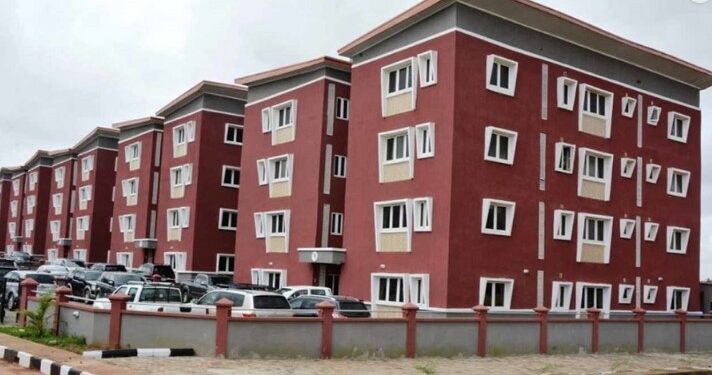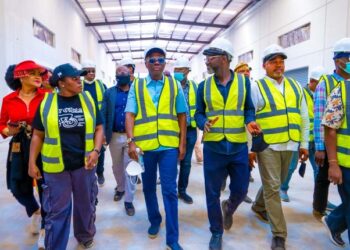In Lagos, Nigeria’s economic capital and most populous state, residents are grappling with a significant housing crisis. The city, known for its robust economy and high population density, now faces rising living costs that are increasingly difficult for many to manage.
In the past four years, rents have skyrocketed by over 100% across the state, far outpacing stagnant incomes or slight increases in earnings. This considerable mismatch is exerting severe financial pressure on the budgets of ordinary Lagosians.
The crisis affects everyone from families to individual residents, who are compelled to curtail essential spending or seek additional incomes to afford housing. Compounding the issue is a critical shortage of affordable housing, which forces many to settle in less desirable houses or relocate further from work.
Personal stories highlight strain
In a conversation with Nairametrics, Charles Okoro, a Lagos resident, described the escalating housing crisis in Lagos as dire. He moved from a two-bedroom apartment at Oke-Afa-Ejigbo area of Lagos four years ago to Abuja. When he returned to Lagos in 2024, he was stunned to discover that the rent for a comparable two-bedroom apartment in the same area had surged dramatically, jumping from N400,000 to N900,000 to N1.1.million.
- “I was completely shocked. I couldn’t believe how the rent had just shot up so much in just a few years,” he explained.
Another Lagos resident, Bisola Oke, spoke to Nairametrics about the steep rent increases she has faced over the past four years. She disclosed that in 2021, she paid N350,000 per annum for a two-bedroom flat at Ojodu Berger. The following year, the rent was raised to N650,000. In 2024, she moved to another two-bedroom flat within the same area, where she now pays N1.3 million per year.
An Ogba resident, speaking to Nairametrics on the condition of anonymity, revealed that the rent for his two-bedroom apartment increased dramatically in 2022, from N500,000 to N1 million annually. He decided to continue renting the same apartment, largely because it is close to his workplace at Opebi, a suburb of Ikeja. He expressed concerns that while his salary is adequate, it hasn’t increased significantly in the past four years, putting a significant strain on his budget. His salary increased only by 10% over the period, but his rent rose by 100%.
Reasons behind rent hikes: Insights from experts
A 2020 Pison Housing Report put Lagos housing deficit at three million units. This shows that millions of residents in the state could be homeless.
Adepetu Emmanuel, an estate surveyor and valuer with A. A. Babarinde & Co., a Lagos-based real estate firm, explained to Nairametrics that rising rents in Lagos are primarily due to a significant influx of individuals from other states and rural regions seeking better opportunities.
He noted that this mass migration into Lagos intensifies the demand for housing, consequently driving up rental costs as landlords and property owners charge higher rents due to the competition for living spaces.
- “The primary reason rents are rising in Lagos is due to the substantial influx of people from other states and rural areas, all searching for better opportunities
- “This increase in migration significantly boosts the demand for housing, which in turn compels landlords and property owners to hike rents due to heightened competition for available spaces,” Emmanuel explained.
He also noted that the high demand for housing in Lagos is further exacerbated by a significant housing deficit in the state. He explained that this scarcity triggers basic economic principles, driving the prices of available houses even higher.
Emmanuel highlighted that the development of efficient road networks into previously hard-to-reach hinterlands is another significant factor contributing to the hike in rents in Lagos.
He specifically cited Ayobo and Ikorodu as areas where the provision of better roads has made more habitable.
Such infrastructure has made the peripheral regions more attractive for residential and commercial activities. He explained that this improvement in accessibility has, over the past few years, driven up demand and consequently increased rental prices in these areas.
Emmanuel pointed to gentrification (transformation of city neighbourhoods from low value to high value, as per Investopedia) as a significant factor driving up rents in Lagos. He described it as the process where wealthier individuals or major companies move into previously undervalued areas. This influx leads to economic and physical transformations that often displace the original, lower-income residents and the neighbourhood’s authentic characteristics, in turn contributing to increased property values and rental costs.
Specifically, he cited the establishment of the Dangote Refinery and the Lekki Free Zone in Ibeju Lekki as examples, where such developments have transformed areas that were formerly affordable, resulting in significantly skyrocketed rents.
- “A few years ago in Ibeju Lekki, a teo-bedroom flat went for N400,000 per annum on average, but now the same two-bedroom apartment goes for as much as N800,000 per annum and above,” he stated.
A real estate consultant in Lagos, who requested anonymity, told Nairametrics that the rising costs of construction and renovation have been major drivers for the increasing rental prices in the state over the past few years.
He explained that inflation affecting the country has escalated the prices of building materials. Consequently, landlords and property owners have been passing these increased costs onto tenants through higher rents.
- “A major driver behind the rising rental prices in Lagos has been the increasing costs of construction and renovation,”
- “Over the past few years, inflation has significantly pushed up the prices of building materials, and landlords, as well as property owners have been transferring these higher costs onto the rents they charge,” he explained.
He also observed that although the rise in rental prices could generally be justified by identifiable economic factors, some landlords and property owners in Lagos have been raising rents without corresponding improvements to their properties.
- “Even though the metrics behind some rent increases can be traced and justified, there are many landlords who are simply raising rents without making any noticeable upgrades to the structures they rent out,” he stated.
The real estate consultant acknowledged that, unfortunately, the number of landlords and property owners in Lagos who raise rents arbitrarily—without clear reasons such as increased construction or renovation costs—is greater than those who have justifiable reasons for their price increases. This contributes to the widespread escalation of rents across the state.
Lagos govt intervenes
The Lagos State government is planning to sanction landlords who increase rents without reasons or rent houses at exorbitant rates.
Moruf Akindero-Fatai, Commissioner for Housing, said in February 2024, noting that the state government plans to sanctions sharp practices in the built sector.
One of the challenges of Lagos residents is the pressure by landlords to pay one- or two-year rents at once. However, the Lagos State government is interested in this area too.
Special Adviser to the Governor on Housing, Mrs Barakat Odunuga-Bakare, said in March 2024 that the state government will enforce monthly rental payment before the end of this year.
“We see what is happening in other climes where rents are being collected monthly. We hope that before the end of this year or early next year, we will be able to enforce the monthly payment of house rents in the state,” she said during a press conference.
Recommendations to stem rising rental prices in Lagos
The rising rental prices across Lagos State, unmatched by similar increase in incomes, pose significant economic and social challenges for residents and particularly squeeze the middle and lower classes.
The disparity between soaring rents and stagnant salaries could lead to more significant problems such as increased homelessness and a surge in demand for affordable housing, which is already scarce in Lagos.
Addressing this crisis requires a multifaceted approach. Emmanuel, a real estate surveyor and valuer with A. A. Babarinde & Co., recommended that the government implement policies aimed at regulating the rental market to prevent exorbitant increases.
He also suggested that the government classify neighborhoods in Lagos into bands that stipulate respective rental price ranges to curb excessive increases by landlords and property owners.
Additionally, he said the development of affordable housing projects is urgently needed to alleviate the burden on those with stagnant wages.
Furthermore, the anonymous consultant earlier quoted advised that the government consider subsidizing the cost of construction materials, which could significantly reduce the expenses incurred by landlords and property owners during construction and renovation—costs that are often passed on to tenants through higher rents.
Bottom line
The escalating rental prices in Lagos highlight the growing disparity between the cost of living and the earning capabilities of its residents. Without prompt and effective measures, affordable housing in Lagos will remain an elusive dream, increasingly beyond the reach of the average citizen, experts say.
As Lagos continues to expand, its leaders must ensure that it remains accessible to all, not just those at the top of the economic spectrum.























